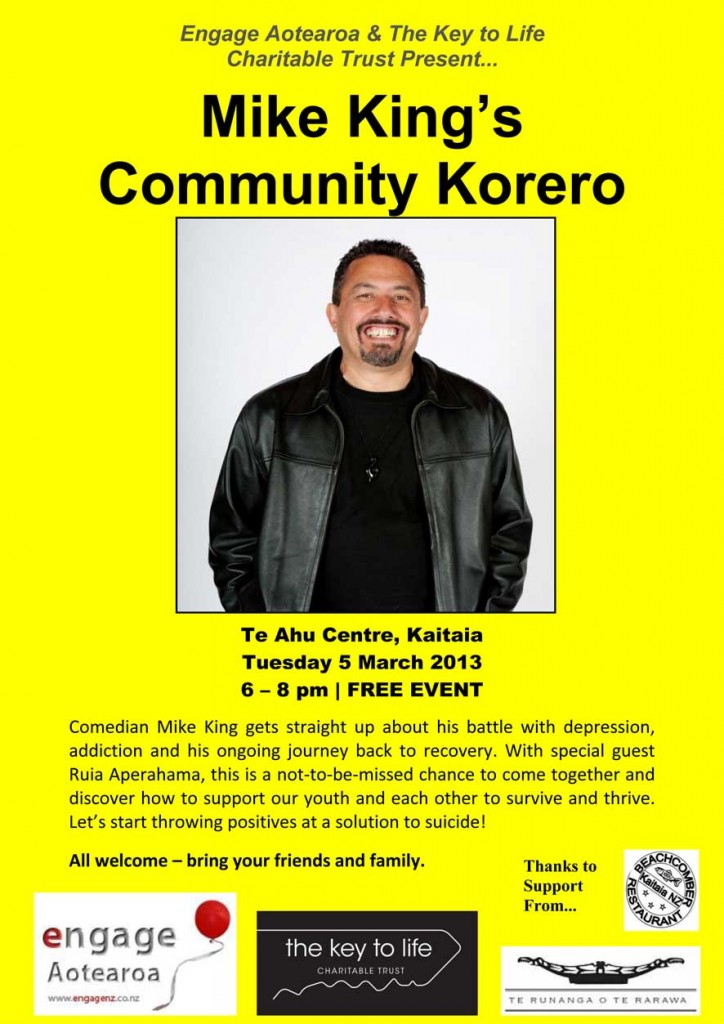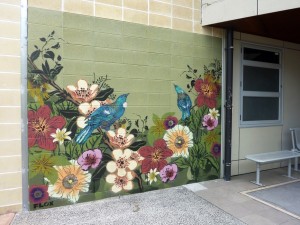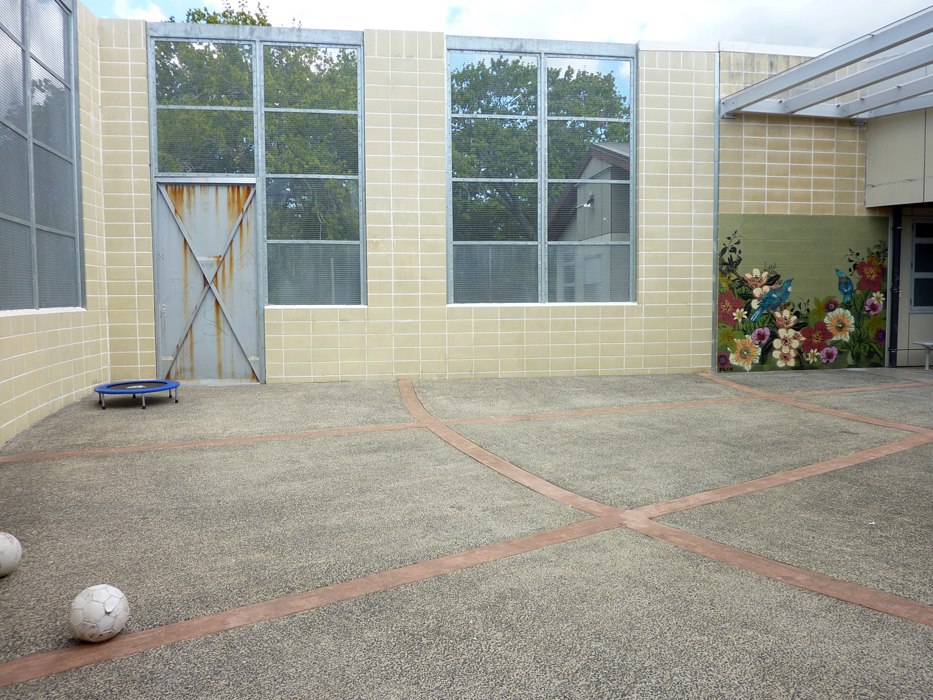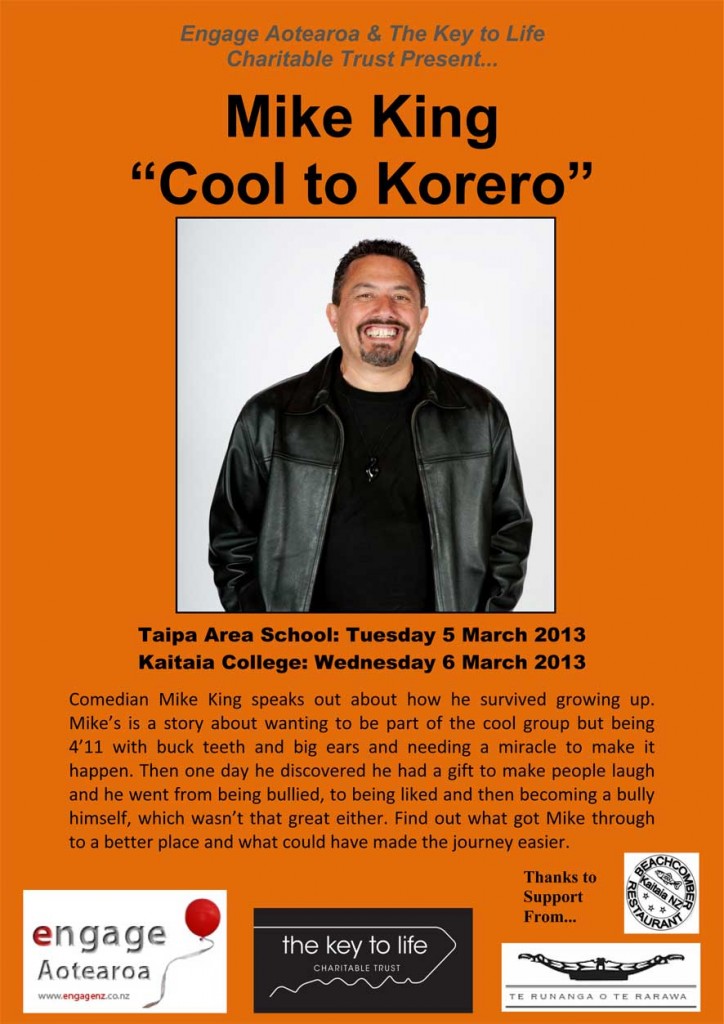Press Release: Engage Aotearoa & Key to Life Charitable Trust
For Immediate Release | 20 Feb 2013
Mike King Visits Kaitaia to Throw Solutions at Suicide
Popular comedian and radio talk-show host Mike King will visit Kaitaia on the 5th and 6th of March for a series of seminars to reduce suicide in the Far North. On the evening of the 5th, King will lead a Community Korero at Te Ahu, accompanied by musician Ruia Aperahama (What’s the Time Mr Wolf, Southside of Bombay, Songs from the Inside). The following day, King and Aperahama will present two seminars for junior and senior students at Kaitaia College, called It’s Cool to Korero.
In It’s Cool to Korero, King will talk with Kaitaia College students about how he survived growing up. Mike’s is the story of a kid who wanted to fit in. It is about wanting to be part of the cool group but being 4’11 with buck teeth and big ears and needing a miracle to make it happen. Then one day he discovered he had a gift to make people laugh and he went from being bullied, to being liked and then many years later becoming a bully himself. Mike will share tips on how to deal with bullies and also why bullies do what they do. Most of all, he will speak about why it is important to talk rather than “have conversations with yourself.” King says his main point is that “in life there will always be hurdles and heartbreak, but with perseverance, support and an attitude of hope, great things will happen.”
Mike King’s Community Korero will take place at Te Ahu from 6 – 8 pm on Tuesday the 5th of March. Entry is free and all are welcome. At the Community Korero, King will speak about his battle with depression, addiction and his ongoing journey back to recovery, including the mistakes he made along the way and the things that made a difference. He will discuss the things he learnt from the hard times and how all those mistakes were blessings in disguise. Both talks will be followed by an opportunity to ask questions and share strategies. This is a not-to-be-missed chance for the community to come together and explore how to support our rangatahi and each other to survive and thrive. Stacks of useful free resources will be available for community members to take away for later use. King says, “It is time to stop throwing negatives at the problem of suicide and time to start throwing positives at a solution!”
This initiative was organised by ex-Kaitaia College student, Miriam Larsen-Barr, who operates a mental-health promotion project called Engage Aotearoa and is currently completing a doctorate in clinical psychology in Auckland. Visiting home for the summer, Larsen-Barr was struck by how many sad stories and suicides had happened in the community in the past year. Larsen-Barr says “I do all this work in other places to promote helpful ways of thinking about mental-health problems and make it easier to approach recovery. It seemed wrong to come home to holiday and not share those resources with the town that grew me.”
Mike King is best known for his role as a comedian and host of the Radio Live talk-show The Nutters Club. But King is also involved in The Key to Life Charitable Trust, an organisation that aims to achieve a zero suicide-rate in New Zealand. King and Larsen-Barr met through their shared passion for preventing suicide (both have been working on projects to tell people’s recovery stories) and when King received the call to make a difference in Kaitaia, he leapt at the chance. King and Aperahama are both donating their time to the cause, The Mental-Health Foundation of NZ is providing additional take-home resources and local organisations Te Runanga o Te Rarawa and The Beachcomber Restaurant have sponsored the initiative to ensure it goes ahead.
More information can be found on Engage Aotearoa’s Mental-Health News and Events Blog at http://www.engagenz.co.nz/?p=3989
_ _ _ _ ENDS _ _ _ _











